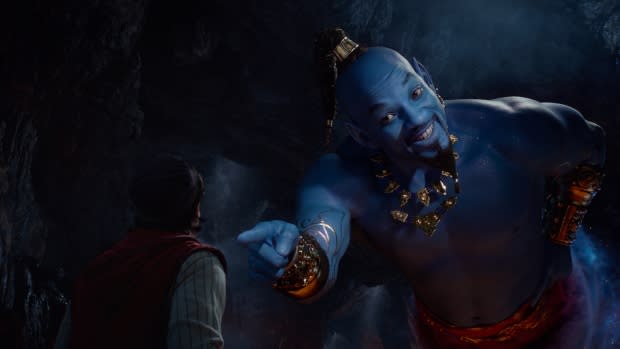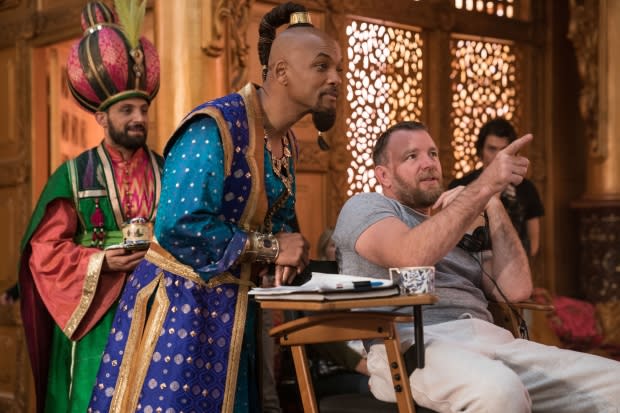Disney déjà vu: Why movie studio is reworking its greatest hits from Aladdin to Little Mermaid

If you're of a certain age, there's likely something familiar about the whole new world featured in the new Aladdin remake.
In 1992, Robin Williams and an army of Disney animators joined forces for a film that rode a magic carpet to the top of the box office.
It was a time of creative renewal for Walt Disney Studios, as the home of Mickey Mouse got its groove back churning out modern-day classics, such as The Little Mermaid, Beauty and the Beast and The Lion King.
Now Aladdin is the latest Disney classic relaunched as a live-action film boasting new songs, big stars and a more accurate representation of Arabic culture.
Future looks familiar
Later this summer, the remake trend continues with the new version of The Lion King boasting a star-studded voice cast, including Donald Glover and Beyoncé. Scheduled for 2020 is the live-action version of Mulan and Cruella, with Emma Stone as the villain from 101 Dalmatians. Fresh off the success of Mary Poppins Returns, director Rob Marshall is already working on a remake of 1989's The Little Mermaid. Plus, fans of Tessa Thompson will need to subscribe to the Disney+ streaming service for The Lady and the Tramp.
While the vision of two doggos sharing a piece of spaghetti may bring the warm fuzzies, there are many aspects of Disney cartoon classics that haven't aged as well. Take for example the slanted eyes and exaggerated accents of the Siamese cats from Lady and the Tramp, or Dumbo's Jim Crow character, and not to mention the decades of damsels in distress.
Part of the problem is they're so damn good. - Boston College associate professor Bonnie Rudner, on the power of Disney's storytellers
Boston College associate professor Bonnie Rudner explores the pros and cons of Disney in her course on folk tales. When she shows the films to her students, she's amazed at what they overlook. "The problem is it's so wonderful when you're watching. Even I'm completely enthralled."
Rudner says where Disney really gets into trouble is in the realm of race and gender. She points to 1992's Aladdin as a prime example. In the original version, the opening lines of the song Arabian Nights were:
Where they cut off your ear
If they don't like your face
It's barbaric, but hey, it's home.
But in 1993, after the American-Arab Anti-Discrimination Committee complained, the line was changed for the home video release to:
Where it's flat and immense
And the heat is intense
It's barbaric, but hey, it's home.
Rudner says Aladdin's problems run deeper than lyrics. In the 1992 film, all the heroes were fair skinned, while the villainous Jafar and his henchmen were darker. Rudner points out, while the people of the fictional Middle Eastern city of Agrabah were mostly toothless thugs, Aladdin had a perfect smile.
"He's poor," she says, "so where the hell did he find a dentist?"
International casting call
Sean Bailey is the president of production at Walt Disney Studios. Speaking with the Los Angeles Times about the Aladdin update, he said, "We're really trying to both honour what has made the story timeless but also make sure we're being cognizant and intelligent about the times we find ourselves in."
For the 2019 version, the studio initiated an international casting call. The result is a polyglot of players: Egyptian-born Canadian Mena Massoud as the new Aladdin, Iranian-American Navid Negahban as the Sultan and the new Jafar is Marwan Kenzari, a Dutch actor with a Tunisian background.

Then there's the genie, played by West Philadelphia's own Will Smith. Stepping into the role made famous by Williams, Smith says he wanted to bring "hip-hop" energy to the character. While he does occasionally appear as blue, Smith adds his own flavour — although audiences might have trouble accepting his Arabic man-bun.
Princess Jasmine has also received a tune-up, evolving from someone swooning over Aladdin to a woman looking to become the first female sultan. Former Power Ranger Naomi Scott landed the role and a new song where she sings about the plight of her people.
Female empowerment or 'cheap woke points'?
Lindsay Ellis is not a fan of the song nor the thread of female empowerment. A film critic and YouTube creator with millions of viewers, Ellis describes the changes to the female heroines in the recent Disney films as "meaningless pop culture lean-in feminism." She says none of Princess Jasmine's agency has changed; "it's just cheap woke points with no relationships to real-world activism."
She says another sign of Disney's insincerity is the people behind the camera. Look no further than the upcoming African epic Lion King directed by Jon Favreau or Aladdin directed by Guy Ritchie. All "old white men who haven't made a fresh interesting movie in a very long time" according to Ellis.

But the new live-action remakes are more than just a change to correct the record. Todd J. Pierce is the host of the Disney History Institute podcast. He sees the remakes as part of a global strategy to "introduce older properties to developing parts of the world."
While Disney films have been a staple in North America and Europe for over 80 years, Pierce says "large parts of the developing world really didn't have Disney releases until the last few decades."
The gen-X sweet spot
While new versions of Cinderella or Beauty and the Beast offer a way to cross-promote Disney classics, Pierce says the push toward sequels and remakes is driven by something much more basic: brand recognition.
In an era where a blockbuster budgets can balloon beyond $200 million, reworked Disney classics hit the generational sweet spot.
"If you were 10 and saw [the original] Aladdin and liked it," Pierce says, "odds are pretty good that you have a kid who's around 10 that you can go experience this newer version with."
Indeed from the next Ghostbusters, the upcoming Shaft and even a live-action version of the He-Man cartoon starring Netflix favourite Noah Centineo, original big-budget films are becoming an endangered species.
When it comes to reworking treasured classics, Disney wrote the rule book. Much of the company's success was built on adapting familiar fairy tales.
But the rush to remakes reminds critic Ellis of another Disney era when direct-to-video sequels flooded the market in the late 1990s and early 2000s. "I think what we're seeing now is just basically a big-budget version of that."
She says back in the era of VHS tapes the cheaper-looking sequels lowered the prestige of the Disney brand.
"Right now, they're trying to like offset that by attaching these big-name directors and by giving them these very big budgets," Ellis says.
"They're cannibalizing their own originality, and that is fundamentally not sustainable."


